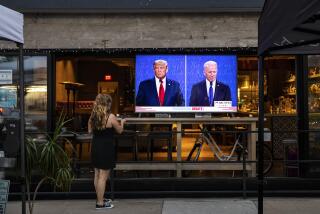TV Coverage Favors Yeltsin, Study Says : Elections: The party endorsing Russia’s leader has gotten much more air time, statistics show.
- Share via
MOSCOW — Media coverage of Russia’s raucous parliamentary election campaign has been severely skewed in favor of the pro-Yeltsin party, a study concludes.
In the first 12 days of the campaign, the two national television channels devoted 293 minutes to coverage of Russia’s Choice, the only party that has officially endorsed President Boris N. Yeltsin. The Communists received 13 minutes, according to the study released Thursday by the Russian-American Press and Information Center.
Moreover, the man who pollsters say is Yeltsin’s toughest competitor, free market economist Grigory A. Yavlinsky, was given only 20 minutes of air time, although before he launched his run for Parliament he often appeared on television, the study found.
“The only place we see Yavlinksy’s name mentioned is in the polls, which consistently show him running second to Russia’s Choice,” said Andrei I. Kasyanenko, one of the researchers.
The findings document how little Russian broadcasters have altered the Soviet tradition of toeing the government line and renew doubts about the fairness of the upcoming election.
The results, however, elicited little surprise among Russian media observers. They noted that mass media boss Mikhail Poltaranin, who as chief of the Federal Information Center controls the purse strings of Russia’s state-controlled television and radio channels, is himself a candidate on the pro-Yeltsin slate.
“Poltaranin, who controls TV, belongs to Russia’s Choice, and that explains it,” said Moscow State University Prof. Boris I. Notkin.
Ostankino television’s coverage is scrutinized the most because the Moscow station blankets not only Russia but also the other former Soviet republics. The station is so influential that when anti-Yeltsin hard-liners rebelled in October, Ostankino headquarters was their first takeover target--a higher priority than even the Kremlin.
Ostankino gave 24 minutes of coverage of Russia’s Choice leader, First Deputy Prime Minister Yegor T. Gaidar, between Nov. 9 and 21, compared to six minutes for Communist Party leader Gennady A. Zyuganov and 10 seconds for Yavlinsky, the study found.
Television and radio have become the dominant political forum for the first time in the parliamentary elections, eclipsing the print news outlets. Central newspapers are less influential and are sparsely distributed in the provinces.
“People are reading their local papers, but their view of what’s going on nationally is formed by television,” said Elisabeth Schillinger, coordinator of the study.
The study covered the early period of the campaign, before all 13 parties competing in the Dec. 12 elections received an hour of free television time. These broadcasts--often tedious and tendentious monologues delivered by wooden-looking candidates--began Nov. 22.
Even if the television coverage is lopsided, the candidates who appear less may end up faring better, said Nikolai K. Svanidze, political commentator for the Vesti TV program. The long diatribes only seem to be alienating many voters, he said.
“Maybe it would be better for them to give the time to their opponents,” Svanidze said.
Whether or not the playing field is entirely level, Notkin said he remains optimistic that the upcoming election will be fairer than in past elections. The televised debate represents a big step toward civility after the political violence of October, he said.
“It is not quite even and fair, but still, it’s an improvement,” he said.
More to Read
Sign up for Essential California
The most important California stories and recommendations in your inbox every morning.
You may occasionally receive promotional content from the Los Angeles Times.













